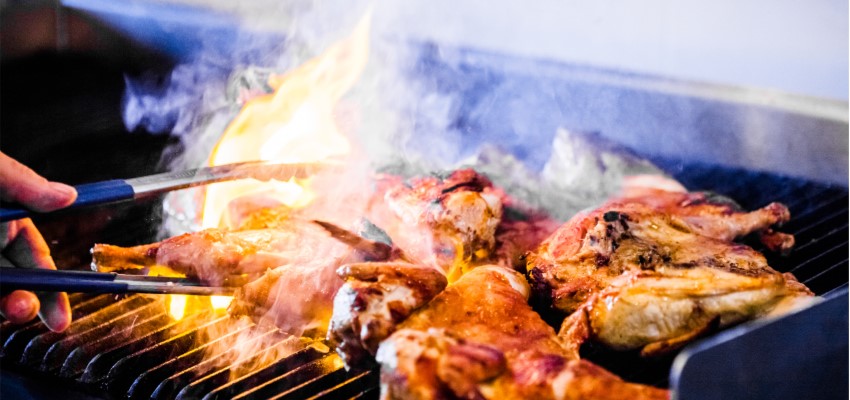EVERYDAY HERO CT SHARES BBQ AND FIREWORKS SAFETY GUIDELINES
Volunteer Firefighter Recruitment Campaign Seeks to Prevent Fires and Personal Injuries
May 24, 2017 | Cromwell, CT – With the return of warm weather and the official start of summer next month, people are firing up their grills and cooking delicious meals and growing excited about Independence Day fireworks. Whether it’s burgers and dogs on a propane grill, kabobs and s’mores over an open flame, or fireworks and sparklers, the members of the Everyday Hero CT volunteer firefighter recruitment campaign cannot stress enough the importance proper use and safety precautions.
“This time of year, there’s nothing better than a backyard barbeque with family and friends,” says Chief Fred Dudek, Everyday Hero CT program manager. “However, grilling poses an increased risk of home fires and personal injury. July is the peak month for grill fires, and more fires are reported on July 4th than any other day of the year. But, by following some simple safety guidelines, people can stay safe and make the kind of summer memories you want to last a lifetime.”
Grilling
According to the National Fire Protection Association (NFPA), two out of three households own a gas grill, and grilling causes an average of 8,900 home fires every year. The NFPA says failure to clean the grill is the leading factor in all grill structure fires, followed closely by the grill being placed too closely to something that could catch fire. And, gas grills are responsible for more fires than charcoal grills.
The NFPA offers the following general grilling guidelines:
- Only use propane and charcoal grills outdoors.
- Place grills well away from homes, deck railings, and out from under eaves and overhanging branches.
- Keep children and pets away from the grill area.
- Keep grills clean by removing grease or fat buildup from the grills and in trays below the grill.
- Never leave grills unattended.
Before using propane grills, look for the following:
- Check the major connection points between the gas (propane) tank hose and the regulator and cylinder, and where the hose connects to the burners. Tighten if loose.
- Check the gas (propane) tank hose for the potential (gas) leaks. To do that:
- Apply a light soap and water solution to the hose using a brush or spray bottle.
- Turn the propane tank on. If there is a gas leak, the propane will release bubbles around the hose (big enough to see).
- If there are no bubbles, the grill is safe to use.
- If there are bubbles, turn off the tank and check connections, then have the grill serviced by a professional before using it again.
- If the leak doesn’t stop, call the fire department immediately.
When propane grills are on, remember:
- If you smell gas, turn off the gas tank and burners.
- If the leak stops immediately, get the grill serviced by a professional before using it again.
- If the smell continues, move away from the grill and call the fire department immediately. Do not move the grill.
For charcoal grills, remember:
- If using a starter fluid, use only charcoal starter fluid. Never add charcoal fluid or any other flammable liquids to the fire.
- Keep charcoal fluid out of the reach of children and away from heat sources.
- There are also electric charcoal starters, which do not use fire. Be sure to use an extension cord for outdoor use.
- When done grilling, let the coals completely cool before disposing in a metal container.
Fireworks
With the start of summer, Fourth of July celebrations also begin and, with them, dozens upon dozens of fireworks displays. Although consumer fireworks are legal in Connecticut, the members of the Everyday Hero CT volunteer firefighter recruitment campaign strongly discourage amateurs from using them.
“The safest way to enjoy fireworks is to attend a public display orchestrated by trained professionals,” says Dudek. “Fireworks are responsible for 40 percent of the fires reported on July 4th each year.”
According to the National Fire Protection Association (NFPA), every July 4th thousands of people, most often children and teens, are injured while using consumer fireworks. In 2011, fireworks caused an estimated 17,800 reported fires, including 1,200 total structure fires, 400 vehicle fires, and 16,300 outside and other fires. These fires resulted in an estimated 40 civilian injuries and $32 million in direct property damage. In 2013, U.S. hospital emergency rooms treated an estimated 11,400 people for fireworks related injuries; 55 percent of those injuries were to the extremities and 38 percent were to the head.
Injuries caused by fireworks typically require hospital emergency room treatment – they include severe burns, fractures, scars, permanent disfigurement, and even death. It’s important to remember that even sparklers, considered by many to be a safe and harmless alternative to fireworks, reach temperatures of more than 1,000 degrees Fahrenheit (water boils at 212 degrees and glass melts at 900 degrees).
The risk of fireworks injury is the highest for children under up to four years old. In 1991, three-year-old Michael Shannon was killed when a legal consumer firework struck him in the head during a July 4th family celebration. He was standing 40 feet away from it, between his mother’s legs where he was presumed safe.
Volunteers Needed
Eighty percent of all fire personnel in Connecticut are volunteers, and the majority of fire departments throughout the state are experiencing a volunteer shortage. Local fire departments need volunteers of all skill levels and abilities, people willing and able to respond to emergencies whenever called upon.
“The skills and experience gained as a volunteer firefighter are invaluable and have a positive and lasting impact on the lives of others,” says Chief Dudek. “Those who join their local fire departments sign up for one of the most rewarding opportunities they’ll ever have.”
About Everyday Hero CT
A partnership of the Connecticut Fire Chiefs Association (CFCA) and the International Association of Fire Chiefs (IAFC), the Everyday Hero CT campaign is a Volunteer Workforce Solutions (VWS) initiative designed to address the shortage of volunteer firefighters in Connecticut. It is helping achieve a viable and sustainable volunteer firefighter workforce fire departments throughout the state. Everyday Hero CT is funded by a Staffing for Adequate Fire and Emergency Response (SAFER) grant awarded to the CFCA by the U.S. Department of Homeland Security’s Federal Emergency Management Agency (FEMA) to develop a model to enhance the recruitment and retention of volunteer firefighters. For more information, visit www.EverydayHeroCT.org.
# # #

